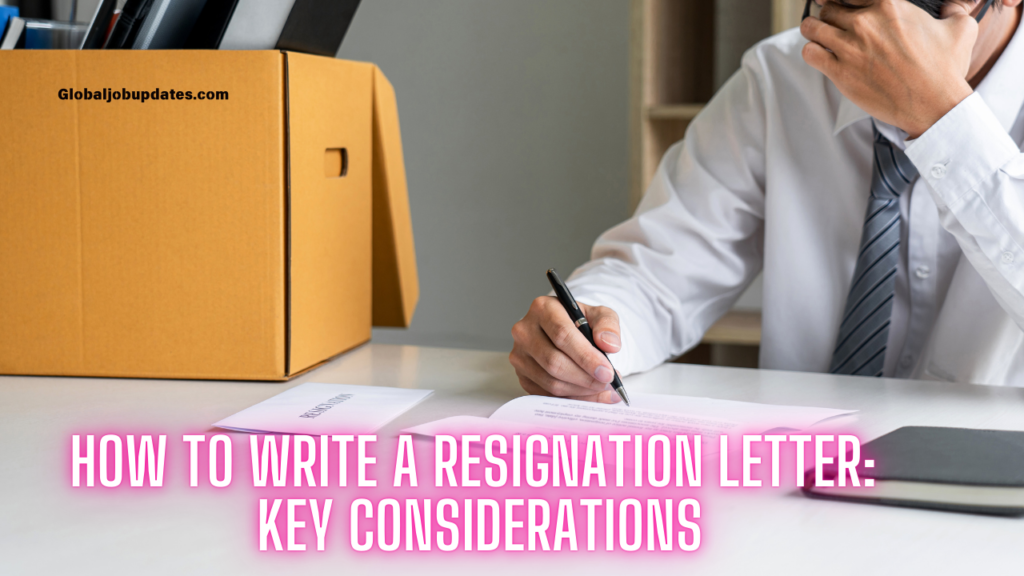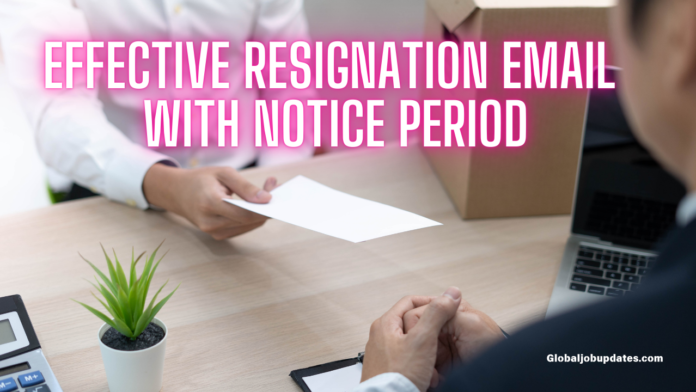Resignation Letter Format: A Guide to Leaving Your Job Gracefully
When it’s time to move on from your current job, writing a resignation letter can be a daunting task. However, a well-crafted employee resignation letter can help you maintain positive professional relationships with your employer and set you up for future success. In this blog post, we’ll provide you with resignation letter examples, templates, and guidance on how to write a resignation letter to ensure a smooth transition as you embark on your next professional chapter.
The Importance of a Thoughtful Resignation
Submitting an employment resignation letter is an important step in the job change process. Even if you’re eager to start a new role, it’s crucial to handle your departure professionally. A well-written job resignation letter allows you to:
- Give proper notice: Providing adequate notice, typically a two weeks’ notice, gives your employer time to prepare for your exit and transition your responsibilities.
- Maintain positive professional relationships: Leaving on good terms preserves your professional network and reputation, which could benefit you down the line.
- Document your departure: A formal resign letter to company serves as a paper trail and helps avoid any miscommunications about your last day.
- Highlight your contributions: Use the letter to reflect on your accomplishments and express gratitude for the opportunities you’ve had.
Key Elements of a Resignation Letter

Regardless of the circumstances surrounding your departure, your resign letter should follow a similar format and include these essential components:
- Opening: Begin by clearly stating your intention to resign and provide your last day of work (the effective date).
- Reason for leaving (optional): If appropriate, you can briefly explain your reasons for leaving, such as a new job opportunity or a change in personal circumstances.
- Statement of gratitude: Express appreciation for the experience, skills, and relationships you’ve gained during your time with the company. Consider including a brief thank you note within your letter.
- Offer assistance: Demonstrate your professionalism by offering to help with the transition period, such as training a replacement or documenting your work.
- Closing: End the letter with a polite sign-off, such as “Sincerely” or “Best regards.”
When considering how to make resignation letter, remember to use proper business letter formatting, including your contact information and your supervisor’s name at the top.
Resignation Letter Samples
To help you get started, here are a few resignation letter examples that you can use as a guide:
Example 1: Simple Resignation Letter
Dear [Supervisor’s Name],
Please accept this resign letter as formal notification of my resignation from the position of [Job Title] at [Company Name]. My last day of employment will be [Date], two weeks from today.
I am grateful for the opportunities for growth and development that I have been afforded during my time at [Company Name]. The experience I have gained here will be invaluable as I move forward in my career.
During my remaining time here, I am committed to completing my duties and assisting with the transition process. Please let me know how I can help to ensure a smooth handover of my responsibilities.
Thank you again for your support and guidance during my tenure. I wish you and the company continued success.
Sincerely,
[Your Name]
Example 2: Professional Resignation Letter Example for a New Opportunity
Dear [Supervisor’s Name],
I am writing to inform you of my decision to resign from my position as [Job Title] at [Company Name]. My last day of work will be [Date], which provides the standard two weeks’ notice.
I have been offered an exciting new role that aligns more closely with my long-term career goals. While I have truly enjoyed my time at [Company Name] and appreciate the support and guidance you have provided, I believe this new opportunity is the best next step for my professional development.
I am committed to ensuring a seamless transition of my responsibilities during the next two weeks. I will complete all outstanding projects and am happy to assist in training my replacement if needed.
Thank you for the opportunity to be a part of the [Company Name] team. The skills and experience I have gained here have been invaluable, and I am grateful for the professional relationships I have built.
I wish you and the company continued success.
Best regards,
[Your Name]
Example 3: Resignation Letter Sample with Notice Period
Dear [Supervisor’s Name],
I am writing to inform you of my decision to resign from my position as [Job Title] at [Company Name], effective [Date]. I understand that transitioning a new person into this role may take some time, and I would like to provide a month’s notice to ensure a smooth handover process.
During my [Time Employed] at [Company Name], I have had the opportunity to learn and grow both personally and professionally. I am grateful for your guidance and support throughout my tenure.
Please let me know how I can best assist with the transition. I am happy to help in any way I can to ensure my responsibilities are properly transferred.
Thank you again for everything. I wish you and the entire [Company Name] team all the best for the future.
Sincerely,
[Your Name]
Tips for Writing an Effective Resignation Letter

- Keep it professional: Maintain a professional tone throughout your letter, even if you’re leaving due to negative circumstances.
- Be concise: A job resignation letter doesn’t need to be lengthy. A short resignation letter that covers the essential information is often sufficient.
- Offer to help: Show your commitment to a smooth transition by offering to assist with the handover process.
- Express gratitude: Even if your experience wasn’t entirely positive, try to focus on the good aspects and express thanks for the opportunities you’ve had.
- Proofread: Ensure your letter is free of errors and presents you in the best light possible.
- Submit properly: Hand-deliver your letter to your immediate supervisor or the HR department, or send it via resignation letter email if that’s the preferred method in your company.
Remember, your employee resignation letter will become part of your employment record, so it’s important to craft it carefully. Whether you’re writing a simple resignation letter or a more detailed one, these guidelines will help you leave your job on a positive note.
Navigating the Job Market in the UAE
If you’re looking for new job opportunities in the UAE after submitting your resignation letter email, be sure to check out the latest job listings and updates on globaljobupdates.com. Our site features a wide range of positions across various industries, from entry-level to executive-level roles.
In addition to job postings, we also offer valuable resources to help you with your job search, including:
- Tips for crafting a compelling resume and cover letter
- Advice on acing job interviews
- Insights into the UAE job market and employment trends
- Guidance on navigating the visa and work permit process
Whether you’re a recent graduate, a seasoned professional, or looking to make a career change, globaljobupdates.com is your one-stop destination for finding the right job opportunities in the UAE.
Start your job search today and take the first step toward your next exciting career chapter.
How to Write a Resignation Letter: Key Considerations

When crafting your resign letter to company, consider the following tips to ensure you create the best resignation letter possible:
- Use a resignation letter template: Starting with a letter template can help you structure your thoughts and ensure you include all necessary information.
- Be clear and direct: State your intention to resign clearly in the opening paragraph.
- Provide adequate notice: Include your last day of work, ideally giving at least two weeks’ notice.
- Offer a brief explanation: If appropriate, briefly explain your reason for leaving, but avoid going into too much detail.
- Express gratitude: Thank your employer for the opportunities and experiences you’ve gained during your tenure.
- Offer assistance: Propose ways you can help with the transition process.
- Maintain a positive tone: Even if you’re leaving due to negative circumstances, keep your letter professional and upbeat.
- Proofread carefully: Ensure your letter is free of errors and presents you in the best possible light.
By following these guidelines, you can create a professional and effective job letter of resignation that helps you leave your job on a positive note. Whether you’re crafting a resignation letter email sample or a formal letter, these tips will ensure your message is clear, respectful, and professional.

